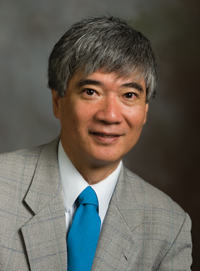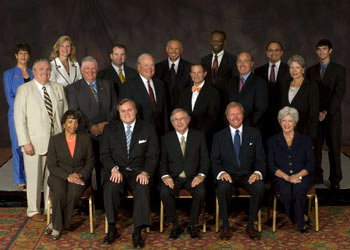|
|
|

Would you like to take another look at the football halftime TV spot? Would you like to see what NBC host and Tech alum Hoda Kotb had to say to the Class of 2008 at commencement? How about watch a film from the 1960s about the Virginia Tech Corps of Cadets, a tribute to Chris Kraft, or some student-made videos? These and more are available on Virginia Tech's YouTube site, www.youtube.com/virginiatech.
Anyone familiar with the popular website knows that if you go to its home page and search "Virginia Tech," hundreds of sports-related and April 16-related videos fill the results. The university's site makes it easier to find other kinds of Virginia Tech-related material.
Although many university-produced videos appear on this YouTube community page, there are also videos produced by students and others, and we would like to add some alumni-produced videos as well. We're looking for anything about Virginia Tech created by people who love the university and want to share their experience.
Any interested alum or friend who makes a short video can submit it to us by contacting viscom@vt.edu so that we can send them the link to our drop box. Then, if the video fits the objective of the page, we'll post it on the site. Also, let us know if there are pre-existing videos that we should add to our list of favorites.
We hope to hear from all aspiring Steven Spielbergs soon.
|
|
 University creates new center for student engagement University creates new center for student engagement
Virginia Tech has launched a Center for Student Engagement and Community Partnerships. Associate Professor James Dubinsky, who co-chaired Virginia Tech's Task Force on Student Engagement, is directing the new center.
The Norris Hall Task Force, formed in the aftermath of Virginia Tech's 2007 tragedy, recommended the center's creation. One of the center's most important functions is to act as a vehicle for coordination and communication between campus and community in order to further the university's land-grant mission and help students live its motto: Ut Prosim (That I May Serve). Dedicated to creating and sustaining reciprocal partnerships that are respectful of all parties' strengths and needs, the center will help to enrich and strengthen the university's discovery and learning missions.
The new center now houses the former Service-Learning Center, directed by Michele James-Deramo, and VT-ENGAGE, coordinated by Karen Gilbert.
 Virginia Tech back in top 50 research school rankings Virginia Tech back in top 50 research school rankings
Based on research expenditures of $366.9 million in 2007, Virginia Tech ranked 42nd among 662 universities nationwide, according to the National Science Foundation Info Brief for the fiscal year 2007 Academic R&D Expenditures Survey, which was posted Aug. 21, 2008.
In fiscal year 2006, Tech ranked 54th with total research and development expenditures of $321.7 million.
"The rise in rankings is the result of our 14 percent growth compared to an average increase in research and development expenditures at academic institutions of 3.5 percent last year," said Rodd Hall, associate vice president for research at Virginia Tech.
According to Robert Walters, vice president for research, the university is about $35 million ahead of its strategic-plan goal to achieve $540 million in research expenditures by 2012. Virginia Tech's growth comes despite a slowdown in federal support for academic research in science and engineering.
|
|
|
|
|
|
|
|
|
|
|
 University establishes new Fralin Life Science Institute University establishes new Fralin Life Science Institute
The Fralin Biotechnology Center and the Institute for Biomedical and Public Health Sciences have been merged to form the Fralin Life Science Institute. The Fralin Biotechnology Center was established in 1995 to promote research, education, and outreach related to the life sciences at Tech and throughout Virginia; the Institute for Biomedical and Public Health Sciences was created in 2003 to provide support to enhance biomedical research at Tech. Dennis Dean, the Stroobants Professor of Biotechnology, will direct the institute. Dean, who will also serve as the associate director for the Virginia Tech Carilion Medical Research Institute, has served as director of the Fralin Center since 2002 and as the interim director of the Institute for Biomedical and Public Health Sciences since 2006. Tracey Talley Schroeder is to serve as the associate director for administration and finance. Schroeder has participated in the start-up and growth of the Virginia Tech Transportation Institute, the Virginia Bioinformatics Institute, and the Institute for Policy and Governance, where she coordinated institute financial and administrative activity.
 Mahajan to lead medical research institute Mahajan to lead medical research institute
Roop Mahajan, the James S. Tucker Professor of Engineering at Virginia Tech, has been named the director of the Virginia Tech Carilion Medical Research Institute, announced Mark McNamee, Virginia Tech senior vice president and provost. Mahajan founded the Center for Advanced Manufacturing and Packaging for Microwave, Optical, and Digital Electronics and the interdisciplinary research center for MicroElectronic Devices in Cardiovascular Applications, both at the University of Colorado. He holds three patents and has five invention disclosures.
|
 |
|
Dean of College of Natural Resources announces retirement
J. Michael Kelly, dean of Virginia Tech's College of Natural Resources, has announced his retirement effective September 2009.
Kelly was appointed as the college's second dean in 2004. During his tenure, the number of new students at the college has doubled, programs have expanded to reflect the university's strategic plan, and external research dollars have increased by more than 60 percent. Kelly has also worked to establish preferred partner agreements with the College of Forest Sciences at the Universidad Austral de Chile and the College of Forest and Environmental Sciences at Kangwon National University in Korea that encourage such opportunities as study abroad, internships, and distance learning.
|
|
|
 Tech ranks among top in undergraduate engineering and business programs Tech ranks among top in undergraduate engineering and business programs
In U.S. News and World Report's "America's Best Colleges 2009" survey, Virginia Tech maintains its spot in the Top 100 Universities at No. 71. The College of Engineering retains its spot in the top 15 engineering schools at No.14, sharing the undergraduate ranking with Johns Hopkins University and Northwestern University. This places Virginia Tech among the top 3 percent of the more than 600 institutions accredited by the Accreditation Board of Engineering and Technology. Among undergraduate business programs, the Pamplin College of Business is ranked No. 43 overall, along with eight other schools, and No. 24 among those at public universities.
 Pamplin graduate receives Fulbright Scholarship Pamplin graduate receives Fulbright Scholarship
Jordan L. Dansby, a 2004 graduate of Pamplin College of Business, has been awarded a Fulbright grant. Dansby currently attends Catholic University of America, where he studies law at the Columbus School of Law. Originally from Keezletown, Va., Dansby plans to spend the 2008-09 academic year researching international trade issues in Colombia. "I want to be a part of shaping a fresh look at the United States," he says.
|
|
|
|
 |
|
Engineering professor receives Humboldt Foundation Award
S. Ted Oyama, who holds the Fred W. Bull Professorship of Chemical Engineering, has received a Humboldt Research Award from the Alexander Humboldt Foundation of Germany.
Oyama, who came to Virginia Tech in 1993, is considered to be a world leader in research of heterogeneous catalysis and inorganic membranes. He has published extensively in the synthesis and characterization of these materials, and his discoveries have led to 10 composition-of-matter patents and license agreements to various companies.
The Humboldt Award, available annually to no more than 100 scientists and scholars, recognizes the recipient's lifetime achievements to date.
|
|
|
|
 Researcher converts biodiesel byproduct into omega-3 fatty acids Researcher converts biodiesel byproduct into omega-3 fatty acids
Zhiyou Wen, assistant professor of biological systems engineering, has found a way to grow omega-3 fatty acids using crude glycerol, a byproduct of biodiesel production. Research has shown that omega-3s can hold health benefits for humans. Wen presented his findings at the 236th national meeting of the American Chemical Society in Philadelphia, Pa., on Aug. 21. Wen's research shows that the glycerol can be used as a carbon source for microalgae that produce omega-3 fatty acids. The algae can then be used as animal feed. The algae has already been used as fish feed, with the fish then showing significant amounts of omega-3 fatty acids. Wen and Audrey McElroy, associate professor of animal and poultry sciences, are now trying to determine whether the algae would work as chicken feed.
 Governor appoints three, reappoints one to Virginia Tech Board of Visitors Governor appoints three, reappoints one to Virginia Tech Board of Visitors
| Gov. Timothy Kaine recently appointed three new members and reappointed one member to the Virginia Tech Board of Visitors for terms running through June 30, 2012. The new appointees are Frederick Cobb of Richmond, owner of Cobb Technologies, one the largest independent document management dealers in Virginia; Douglas Fahl of Leesburg, executive vice president of Dewberry, a professional services firm with 34 offices and 1,955 employees nationwide; and Calvin Jamison of Richardson, Texas, vice president for business affairs at the University of Texas at Dallas and former senior vice president and chief administrative officer at Hampton University. Beverly Dalton of Campbell County was reappointed. Dalton chairs the board at English Construction, a family-owned firm founded in 1909, which provides construction services throughout the Mid-Atlantic. |
|
 |
|
|
|
 Civil War radio programs soon available on CD Civil War radio programs soon available on CD
Civil War buffs will soon be able to purchase a CD of 36 of James I. Robertson Jr.'s radio commentaries that were aired by WVTF Public Radio Station during the past 14 years. Proceeds from the sale of the CD, "The Many Faces of the Civil War," will support programs of Virginia Tech's Virginia Center for Civil War Studies. Robertson, an Alumni Distinguished Professor of History at the university, is a noted Civil War historian and author who has earned national acclaim for his work. For information on purchasing the CD and a list of the radio programs that will be included, go to the Civil War center's website at www.civilwar.vt.edu.
 Virginia Tech receives NSF nanotechnology grant money Virginia Tech receives NSF nanotechnology grant money
Researchers from geosciences and civil and environmental engineering at Virginia Tech are part of a consortium of four principal universities and five other schools awarded a multimillion dollar grant to study nanotechnology and the environment. This is one of only two such consortiums funded by the National Science Foundation (NSF) for forming a national Center for the Environmental Implications of Nanotechnology. Total funding for the project is $14 million over five years with an opportunity to renew for another five; Virginia Tech's portion is $1.75 million. The center is to be headquartered at Duke University, with other schools including Carnegie Melon University, Howard University, University of Kentucky, and Stanford University also involved in the research.
As much as 1 million times smaller than the head of a pin, nanoparticles have unusual properties that could be beneficial in fields that include medical technologies, computer hard-drives, and cosmetics, but their effects on the environment remain virtually unknown. Through integrating research in fields such as ecology, cell and molecular biology, geochemistry, environmental engineering, nanochemistry, and social science, researchers are charged with the task of assessing the environmental implications of nanotechnologies.
|
 New site showcases impact of Tech on lives of Virginians New site showcases impact of Tech on lives of Virginians |
|
 |
|
The university has launched ThisIsTheFuture.com to highlight how Virginia Tech's innovative research and its high-quality educational and outreach programs impact the daily lives of Virginians. The goal of the user-generated website is to show how Virginia Tech serves Virginians through teaching, research, and outreach. Because individuals throughout the commonwealth also make a difference in their own communities, people who visit the site are encouraged to share their own stories of how they, too, enhance the lives of Virginians. The campaign will run throughout the fall.
|
|
|
|

 Wayne Scales Wayne Scales |
|
|
Space@VT:
An emotional tie and
three strikes of lightning later
by Lynn Nystrom
The naysayers said it couldn't be done. But sheer determination on the part of Wayne Scales proved them wrong.
In 1992, Scales was among the nation's entry-level assistant professors of electrical engineering. His specialty--space plasma physics--was not the topic of a household dinner conversation.
Cornell, where he obtained his Ph.D., encouraged Scales to consider joining its faculty, but instead, he joined the Virginia Tech Bradley Department of Electrical and Computer Engineering. His Cornell colleagues felt that because Virginia Tech did not have a space science and engineering program, it would be too difficult for Scales to initiate an enormously expensive competitive research program by himself, but Scales had an emotional tie to Southwest Virginia. An only child, he wanted to live near his mother, who still resided in Ridgeway, Va. Scales followed his heart, and in a little more than a decade, he became the director of the Center for Space Science and Engineering Research at Virginia Tech, otherwise known as Space@VT, with annual research revenues of about $2.5 million.
The center was the result of a proposal that Scales and Joseph Wang of aerospace and ocean engineering submitted to the National Science Foundation (NSF), which awarded them $805,000 in 2005 to create the interdisciplinary center for space research. Scales became the director and Wang the associate director. The NSF funding enabled the hiring of faculty, including Robert Clauer, one of the most noted names in magnetospheric physics in the country, who was designated as the second associate director, as well as Brent Ledvina, one of the most highly respected space scientists nationwide, and Scott Bailey, a talented space-instrument and space-mission scientist.
"These were like three strikes of lightning," Scales says, and the next bolt came shortly afterward. Within a year of the research center's announcement, Virginia Tech was able to persuade the highly prestigious SuperDARN Radar Group--an international radar network for studying the Earth's magnetosphere, ionosphere, and connection into space--to relocate from Johns Hopkins University's Applied Physics Laboratory to the Blacksburg campus. The group's move brought Ray Greenwald, described by Scales as the "godfather" of the SuperDARN group, and researchers Joseph Baker and Michael Ruohoniemi to Virginia Tech. NSF support was then used to create a doctoral specialization in space science in electrical and computer engineering and aerospace and ocean engineering, including the development of several new space-oriented courses.
"It makes sense that Virginia should excel in space science and engineering," says Scales. "A lot of things are coming into alignment."
For more on Space@VT, go to www.space.vt.edu.
|
|
|

